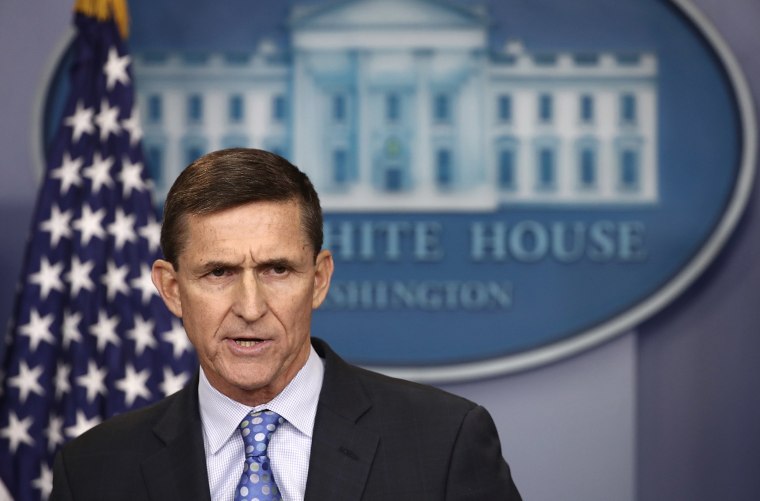Tension between the Trump administration and Iran continued to rise Wednesday when National Security Adviser Michael Flynn said the White House was putting Tehran "on notice," an apparent threat of retaliation for a recent ballistic missile test.
Flynn said in a statement that the launch defied a U.N. Security Council resolution aimed at keeping Iran from developing nuclear-armed missiles.
Related: Iran Test-Fires Medium Range Ballistic Missile: U.S. Officials
Flynn, a retired Army general and former head of the Defense Intelligence Agency, delivered his remarks in a surprise appearance at the daily White House press briefing. He cited other examples of what he called Iran's "destabilizing behavior across the Middle East," including reported attacks on U.S. allies by Iran-backed Houthi rebels in the Red Sea.
He pointed out President Trump's disapproval of the Obama administration's agreements with Iran — including, presumably, a multinational deal to lift economic sanctions in exchange for a promise not to develop nuclear weapons — as "weak and ineffective."
Flynn suggested that the new administration would take a harder line.
"Instead of being thankful to the United States for these agreements, Iran is now feeling emboldened," Flynn said. "As of today, we are officially putting Iran on notice.”
What exactly that means is unclear.
Flynn did not take questions after delivering his warning. White House spokesman Sean Spicer declined to elaborate in an afternoon press briefing.
National security officials told reporters later that the administration was considering a range of options, including economic sanctions and supporting forces that counter Iranian action in the region.
They stressed, however, that they saw the missiles and other destabilizing behavior by Iran as separate from the nuclear deal. They would not say whether Trump wants to pull out of the nuclear deal.
Flynn's message was aimed to get Iran's attention, the officials said.
Last week, Trump included Iran on a list of seven majority-Muslim countries whose citizens would be temporarily banned from entering the United States.
Iran used to be prohibited from test-firing ballistic missiles under previous U.N. resolutions. However, these were superseded by a new resolution passed alongside the nuclear deal.
This only "called upon" Iran not to test-fire missiles that could be used to deliver nuclear weapons. Critics of the deal say this wording is effectively a loophole meaning the missile-testing restrictions are not obligatory.
The government in Tehran says that because it doesn't have a nuclear-weapons program, its missile tests are not violations of this clause.
Iranian Foreign Minister Javad Zarif didn't confirm or deny the launch during a press conference Tuesday but said, "The missiles aren't part of the nuclear accords," Reuters reported. "Iran will never use missiles produced in Iran to attack any other country."
Flynn's remarks Wednesday followed assertions Tuesday by Nikki Haley, the U.S. ambassador to the United Nations, that the Trump administration would not "show a blind eye" to Iran's actions.
"We're gonna act, we're gonna be strong, we're gonna be loud and we're gonna do whatever it takes to protect the American people and the people across the world, because that's what the goal is supposed to be," she said.
Israeli Prime Minister Benjamin Netanyahu said in a statement that he planned to press Trump to renew sanctions against Iran and "take care of this failed nuclear agreement."
He added, "Iran's aggression must not go unanswered."
The National Iranian American Council called Flynn's statement "reckless," and said it risked retaliatory behavior.
"While Flynn’s remarks could be construed as simply bluster, they will beget an Iranian response which in turn will beget further threats by the U.S.," NIAC President Trita Parsi said in a statement. "At some point, this escalatory cycle that started with bluster may end in war."

